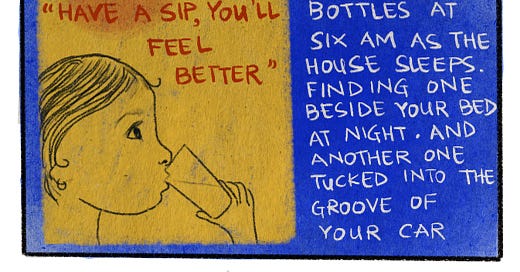This week, the poems came like water. That is to say, they found me when I needed them most. At first I didn't realise I was thirsty. Once I did, the need to quench my thirst grew until it was impossible to ignore
I felt better as soon as I read the first poem (by Meera Ganapathi, featured in the comic below).
It reminded me how easy it is to forget that sometimes the solution to a problem isn’t what immediately solves the problem. It is taking a step back and taking a deep breath. Taking a break from linear logic. A pause. A drink of water. A poem.
I discovered this week’s poem, Love is a Drink of Water thanks to my friend and writer Sonia Thomas. Over the years, Sonia has had a way of sensing exactly what her friends need before they do—especially when it comes to poetry. We first met through my former home on the internet, BuzzFeed Inc., which introduced me to some of my favourite humans, both online and offline. When I couldn’t imagine a world outside of journalism, courts and newsrooms, Sonia recognised I was thirsty for something that I hadn’t yet acknowledged. On a birthday years ago, she sent me a book of illustrated poems, along with a box of paints and a paintbrush. It was the first invitation I ever received to think about art as something I could make, not just consume.
I’m turning a year older next week and I feel more aware than ever of existing in a suspended state of transition, a limbo between journalism and art. For a person who has been a professional writer her entire adult life, I realise I rarely have the right words. When someone I love is struggling or in pain, I switch seamlessly into problem-solving mode. I project what I would do in the same situation. I pull impractical solutions out of a hat like a sad conjurer. I tie myself into knots trying to loosen theirs.
But as someone struggling to live a creative life, I bristle with irritation when someone offers me the same kind of care. I don’t need advice I just need you to listen, I say before regressing to a sulking teenage self.
This week’s poem came with the reminder that when you can’t think of the right thing to say or do, offer the person you are attempting to soothe and yourself a glass of water.
“Have a sip, you’ll feel better.”
Reading Ganapathi did what the best kind of art does: it made me pause. I read her poem a few times the same evening. I thought about it as I drifted off to sleep. I re-read it the next morning, lingering over a different sentence each time, tracing a line from her words to the memories they stirred. I felt a deep gratitude for the countless drinks of water people have offered me over all these years of being alive.
Incontrovertible, liquid evidence that the world is full of care.
The next morning, I wrote to her and asked if I could illustrate her words, which she kindly agreed to let me do. The comic below is my way of saying thanks. (You can also read it and other poems by her on her Instagram)
This is your weekly reminder that I need your support to keep creating. Here are some ways in which you can help me to keep going:
Subscribe to this newsletter and/or forward it to a friend.
Buy prints — you can choose an artwork that you like from the archives of Now&Zen, from my Instagram or write to me and commission an artwork of very own.
Love is a Drink of Water
by Meera Ganapathi
Some pauses for this week:
1. Sarah Kay reading Forest Fires (a poem she wrote 2010 which gave me chills this week for how prescient it is about grief and well, the current fires of the world).
Maggie Smith deserves to be the internet’s favourite poet and if you haven’t read Good Bones yet, allow me to introduce you to a poem you’ll repeat to yourself of for years to come.
ALSO, she has her own newsletter on Substack.
And finally, this poem by her which is how I am currently making sense of the news about Ukraine, about Gaza, about all the horrors that persist.
How Dark the BeginningBy Maggie Smith
All we ever talk of is light—let there be light, there was light then,
good light—but what I consider
dawn is darker than all that.
So many hours between the day
receding and what we recognize
as morning, the sun cresting
like a wave that won’t break
over us—as if light were protective,
as if no hearts were flayed,
no bodies broken on a day
like today. In any film,
the sunrise tells us everything
will be all right. Danger wouldn’t
dare show up now, dragging
its shadow across the screen.
We talk so much of light, please
let me speak on behalf
of the good dark. Let us
talk more of how dark
the beginning of a day is.
More soon,
Nish






